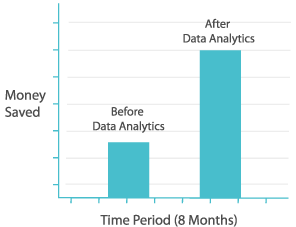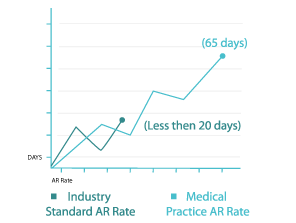
What role does Data Analytics play in the Medical Billing Process?
Medical Practitioners rely heavily on their Medical Billing reports streamlining their revenue cycle management processes.
- To understand the points where they are losing money
- To judge the efficiency of their Medical Billing Process
- To analyze their overall collection rate
The use of data analytics is a quality-driven approach for Medical Practitioners to analyze and improve their Revenue Cycle operations step by step.

The University of Kansas Health System was facing a denial rate of 25%. With the help of data analytics and a proper reporting system, in eight months, they were able to save $3 million – the direct result of denial reduction. (Health Catalyst)
Medical Billing reports help Medical Practitioners to:
- Identify data trends
- Analyze claims activity
- Improve their Medical Billing Processes
- Identify key factors responsible for revenue growth
- Get insights into future operational strategies.
Data analytics empower Medical Practices with better decisions making capabilities. Without real-time reports, it is impossible to track and tweak Revenue Cycle deficiencies.

A recent report states that the Accounts Receivable of a Medical Practice has reached 65 days, due to their poor data collection and Medical Billing reporting system. (Outsource Strategies International)
How can Medical Practices use the power of Analytics to streamline their Medical Billing process?
Medical Billing is an ongoing process that is connected at various steps, data can be used at all of these steps to optimize the process on the whole

Scheduling
Data can be analyzed to pre-plan the time/date of appointments depending on previous trends for appointment cancellations. Moreso, the demographics of patients can be used to create appointments as per their ease e.g., working parents can be given time for Saturdays, etc

Eligibility Verification
Data can be analyzed to prepare the claims as per the third-party provider’s requirements depending on the previous trends for claims rejections/denials. Checks can be made with added points on which aspect should be reassessed before submitting the claim.

Medical Coding
Medical coding is a sensitive process of Revenue Cycle Management foregoing claim submission. Data analytics for this process can help to pinpoint errors trail and avoid further coding errors that can lead to claim denial.

Claim Scrubbing
Data can be analyzed to understand the recurring errors in the claims e.g., perhaps the same CPT code is being denied with every submission, such errors need to be corrected for medical billing efficiency.

Claim Submission
Data on previous claims can be pivoted to see the chances of denials in the current claims list. This can help prevent the chances of rejections/denials hence fast-tracking the claim lifecycle.

Claim Tracking
Data through dashboards can be analyzed to make sense of delays in reimbursements. AnalysVes of current data plus the trends from previous, can help understand the current claim status.

AR Management
Analysis of denied claim data and of reasons for which it happened can help understand the AR rate for claims. Actions can then be taken at a root level to manage Medical Practice’s AR.

Payment Posting
Data accumulated from previous posting plans can help to refine this process for the future by resolving all repeating issues and to collect more reimbursements. As it is the most important step in the Medical Billing process, it needs to be precisely taken care of.
Conclusion
To sum it up, the Medical Billing industry has transformed significantly.
Where once, Medical Practices were more focused on day-to-day business activities now with the help of technology and analytics they can properly strategize their operations.
They have realized that without a detailed analysis of data, it is hard to optimize Medical Billing Process and track Key Performance Indicators.
Partnering with experts like AltuMED can help free up the valuable time otherwise spent on data analysis and generating medical reports. Our PracticeFit software’s smart dashboards are well-equipped to collect data and build reports in a matter of clicks. We aim to provide valuable insights to Practitioners about their Medical Billing data through Medical Billing reports to help them make smart decisions about future operations.
Subscribe to Our Newsletter!
Subscribe to Our Newsletter!
Enter Your Email Address. We Promise We Won't Spam You
Relevant Articles
Categories
Informational
Educational
Medical Billing Software

